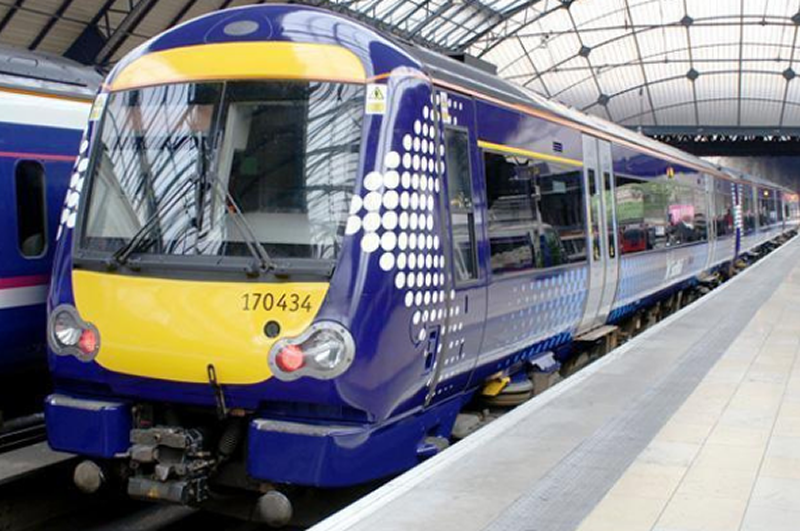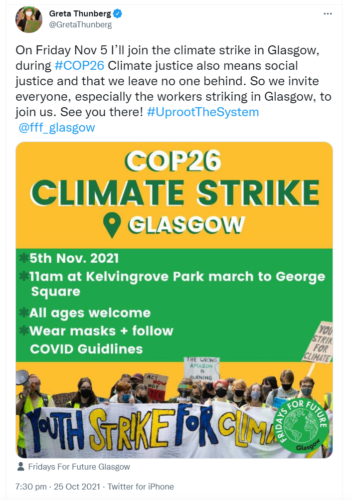On almost the eve of COP26 in Glasgow, Scottish rail workers have won a stunning victory on pay while council workers still plan to strike. Mike Picken reports for ecosocialist.scot
Late on Wednesday 27 October, after an arbitrary deadline set by the employers had passed, the RMT trade union accepted a new pay offer forced out of ScotRail by the threat of a total two week closure of the network during COP26.
The RMT won a 2.5% twelve month pay award backdated to last April, an extra £300 for all ScotRail workers due to the pressures of hosting COP26, and an improvement in terms on working rest days. Following the decisive vote for all out strike action by RMT members and months of action on Sundays that shut most of the network, the employers offered a 4.7% increase over two years coupled with a worsening of terms and conditions. While other rail unions accepted the RMT stuck out and forced a new offer.
RMT General Secretary Mick Lynch in hailing the victory has also called on SERCO to resolve the parallel dispute on the Caledonian Sleeper service. Linking the rail workers claims for investment in rail in the light of the COP, Lynch stated: “There can be no climate justice without workplace justice”.
On the same day that the RMT called for the Caledonian Sleeper service between Scotland and London to be transformed into an alternative to air travel, the UK Chancellor Rishi Sunak announced that he would be cutting air passenger taxes on domestic flights and freezing fuel duty, promoting air and road travel at the expense of rail and the climate.
Demonstration 6 November
The victory and calling off of the industrial action means that thousands of environmental activists attending the COP26 and the big demonstration on 6 November will now be able to use the train network to get to Glasgow. It’s a victory for all workers in Scotland and shows that strong trade union action can force concessions from reluctant employers, despite the UK government’s draconian anti-trade union that make it exceptionally difficult to win a legal postal ballot. Rail workers will now be set to demand further improvements in workers conditions and reinstate rail service cuts when the ScotRail service is transferred from the private Abellio company to a publicly owned service run by the Scottish government in March 2022.
Council Strikes
Despite the victory on rail, the strikes over pay planned by Glasgow City Council workers are still going ahead and will escalate across other parts of Scotland during the COP26, as unions stepped up joint action over local government pay.
A series of ballots have been held in Scotland’s 32 councils to reject the miserly pay offer affecting around 120,000 workers offered by the employers’ body, COSLA (Convention of Scottish Local Authorities). GMB union members in Glasgow’s cleansing and schools departments have already voted for strike action from 1 November that would stop rubbish collection and severely disrupt schools across the City. Further ballots among selected workers for strike action have been successful in a large number of councils. On 25 October the joint union committee for the pay negotiations, comprising the Unite, Unison and GMB unions, wrote to the employers and announced that they were calling further action across the country from 8 November. The workers coming out on strike cover school cleaning, school catering, school janitorial, waste, recycling and fleet maintenance services, and will have a severe effect on the operations of a majority of Scottish councils.
The joint union pay demand is for a paying increase of at least £2,000 or 6% and a minimum of at least £10.50 per hour. The employers offer of only £850 or 2%, with a minimum pay rate of £9.78 per hour has been decisively rejected by unions.
Council workers in vital public services such as cleansing are demanding to be treated as essential worker, like NHS and care workers during the pandemic. The SNP-led council in Glasgow has been under constant attack in recent weeks for the state of the city’s refuse and vermin infestations. While the Council leaders are desperately trying to present the best possible image of a ‘clean city’ during COP26 when the eyes of the world will be on Glasgow, only a proper investment in council services and workers can produce such an outcome. As if a reminder of the effect of climate change, the City was deluged with torrential rainfall on the evening of 27 October causing floods and mess that had to be sorted by the very same council workers taking strike action the following week.
Workers across Britain face a huge cost-of-living crisis emerging from the pandemic, with spiralling energy costs and price increases due to the road haulage driver shortage exacerbated by the Tories ‘hard’ Brexit, increases in national insurance and income tax, and cuts in benefits including for those in low paid jobs, while the wealthy avoid paying their fair share through selective tax cuts that benefit them like the reduction in taxes on internal flights. The Tory UK government’s Budget and Public Expenditure announcements from the Chancellor on 27 October do little to address the crisis in living standards of working class people. The Tories say they want a high wage economy – but they only raised the minimum wage to £9.50 for those over 23 while private sector employers squeal about the impact of raising wages on their profits and many public sector budgets face real terms cuts in government funding. The only way to deal with the cost of living crisis is by workers joining unions and demanding pay rises through the threat of industrial action.
SNP, Greens and Labour need to take action
Scottish councils are primarily funded by the Scottish government – now comprising the Scottish Greens in an agreement with the SNP administration. Labour is also making noises in support of increased pay and between them the SNP, Labour and Scottish Greens, all ‘left-of-centre’ political parties, have over half of all Scottish Councillors influencing the COSLA employers. Both Labour and the SNP lead various administrations in the councils, though Labour to their shame are in coalition with Tories in several councils and a Labour councillor in West Lothian defected to the Tory party earlier this week.
Both the Scottish government and councillors in the three parties (and independents) should put pressure on COSLA to make an immediate improvement in the pay offer and urgently re-open negotiations with the unions.
If there are council worker strikes from 1 November, other workers should join picket lines and show solidarity so that the council workers are not isolated.
Thunberg offers solidarity
In an excellent initiative, environmental activist Greta Thunberg has agreed to come to Glasgow for COP26 during the strikes to address the Fridays for the Future school strike and demonstration on Friday 5 November, and has called for support for striking workers. That this solidarity has been welcomed by GMB Scotland , a union that traditionally has had a defensive attitude towards fossil fuel industries, is a step forward in further linking the environmental and workers movement.






